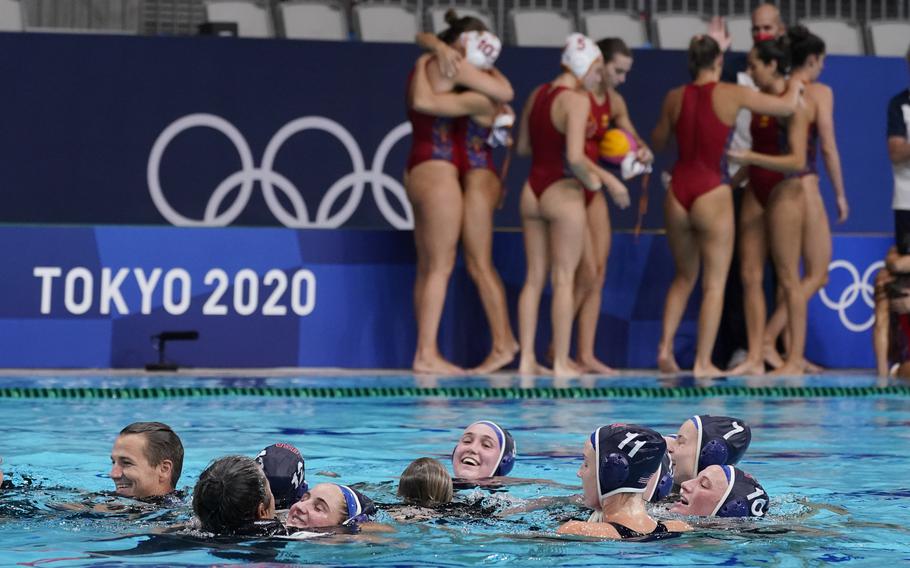
The United States women's water polo team celebrates in the pool as Spain's players console one another in the background after the gold medal match at the 2020 Summer Olympics, Saturday, Aug. 7, 2021, in Tokyo, Japan. (Mark Humphrey/AP)
TOKYO — The element of spontaneity involved in tipping buckets of Gatorade onto coaches' heads or hoisting them on a team's shoulders is nice and all, but "nice" is a few dozen pool lengths away from the proper adjective to describe the U.S. women's water polo team in the gold medal game Saturday. "Methodical" might suit them better; perhaps "exacting." So naturally, they thought to ask Coach Adam Krikorian to remove the cellphone from his pocket before they dumped him into the pool in celebration.
"We always bring him into the water with us," defender Melissa Seidemann said.
Saturday's accomplishment was worth a dunking. The United States won an unprecedented third consecutive gold medal with a dominant 14-5 win over Spain in which nine players scored and goalkeeper Ashleigh Johnson kept them anchored from the back, saving 11 of the 15 shots she faced.
Spain never had a chance after Alys Williams opened scoring 27 seconds into the game to kick off another dominant performance for the Americans when it counted most. In the group stage, a stumble against Hungary was their first loss in the Olympics since 2008. In the semifinals, they needed a comeback victory over Russia to ensure they could continue their streak of medaling at every Olympics since women's water polo was introduced in 2000.
But the gold medal match felt almost inevitable after they led 4-1 in the first quarter, and the result was no surprise: The United States has won every major international title in women's water polo since 2014.
Even still, Coach Adam Krikorian prefers to speak about the achievements of this particular roster rather than the history of the program.
"People make a big deal of the three-peat -- this is the first one for that team," Krikorian said. "It's this one, that team, those 13 women out there and that staff that worked their tails off to make that happen."
Part of that is how Krikorian operates, his instinct always to shy away from the praise his players heap on him for establishing the program's culture since taking over in 2009.
But part of it is simple fact: No U.S. women's water polo team ever before won a gold medal after a spell in which they didn't play a game for some 460 days because of a pandemic, forcing them to do the best they could to replicate that intense atmosphere in scrimmages.
In a real water polo game, it's helpful to remember, players often are swimming nearly on top of one another, kicking and shoving and pulling and, it seems, staying just this side of attempted drowning.
"Our team definitely had some tiffs, had to get at it with one another and beat each other up every single day," attacker Maggie Steffens said. "You can imagine, the locker rooms were tense after that."
Beyond the challenges of the pandemic, which multiple players said wreaked havoc on their mental health, the Americans had dealt with an inconceivable amount of personal tragedy in what they refer to as the "quad-plus" interim between Games.
The Olympics have been a site of pain as much as joy. Five years ago in Rio de Janeiro, Krikorian found out his brother died of a heart attack at 48. At the same Olympics, Seidemann's mother suffered a stroke; she died nearly a year ago while her daughter was preparing for Tokyo.
Attacker Kaleigh Gilchrist suffered a career-threatening injury in 2019 when she and her teammates were celebrating after the world championships and a second-floor balcony in a Seoul nightclub collapsed. Even through months of rehab, she questioned whether she would make the Olympic roster, using the extra year from the delayed Games to work to regain the fitness she might not have had in 2020.
"Coming back from injury and losing mentors and coming back from panic and PTSD, it was a lot," Gilchrist said. "But this extra year might've helped me grow and be able to compete the way I wanted to in these Games."
When the water polo team talks about the oft-used narrative of "overcoming adversity," they mean it. Krikorian was moved nearly to tears when he spoke about the challenges of the pandemic Saturday, afterward calling himself "totally fried."
"Obviously the world has gone through a hell of a lot the last 17 months ... so I don't want to diminish that. But what every single one of these athletes up here, and these coaches, and these teams and every single Olympic athlete and coach and staff member that has been here to get to this point, is a frickin' gold medal in itself," Krikorian said. "I'm telling you right now. There hasn't been enough written and said about it: Just to get to this point has taken a lot. And I'm saying this now and I'm about ready to frickin' break down, because it's been hard.
"I think it just takes us back to the beauty of the Olympic Games. It takes us back to the beauty, even when you're struggling, of the mental strength of these athletes. ... Yeah, we won a gold medal. But every single person who's been here has been through a heck of a lot."
To hear Krikorian talk is to understand why he speaks about this team singularly from his others who've won gold. Gilchrist was standing closest to him when they finally won Saturday, so it was her he bear-hugged first. Then Johnson, the game's hero, high-stepped over to her coach and screamed so loud she feared she popped his eardrum.
This was all before Krikorian got dragged into the water with his team, a traditional celebration for the group. It's happened many times before. This one felt different.